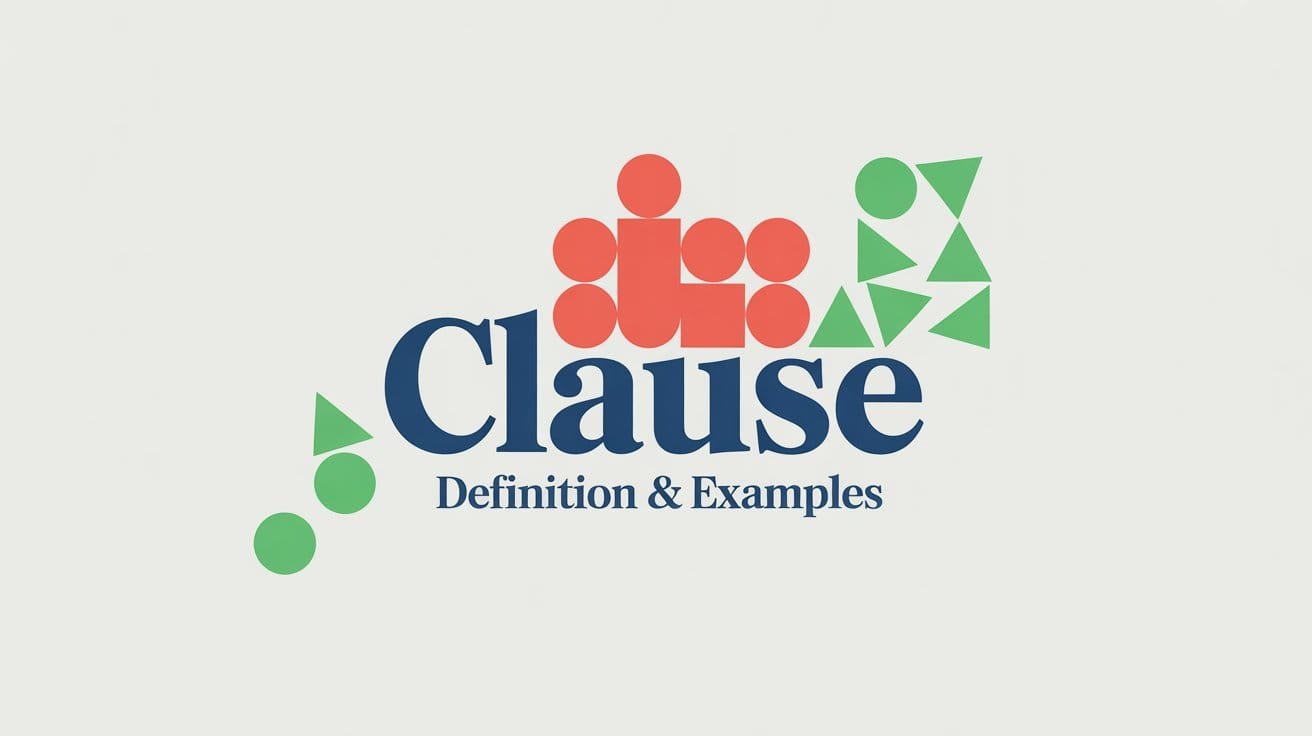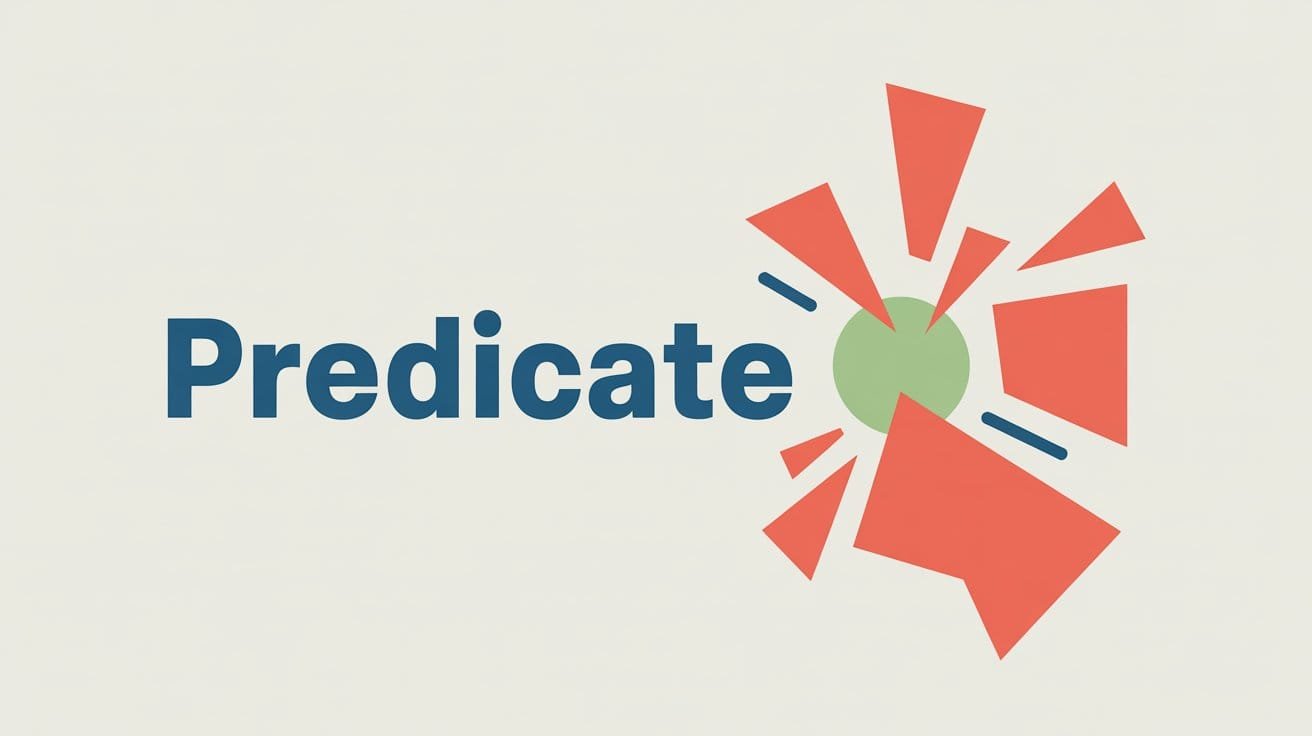To understand how English sentences work, you need to start with clauses. A clause isn’t just a random group of words; it’s a unit that contains a subject (who or what the sentence is about) and a verb (what is being said about it). Together, these two parts form the core of meaning in any sentence.
In this article, you’ll learn what a clause is, how it’s structured, and how to identify one in writing.
Definition of a Clause
A clause is a group of words that contains a subject and a verb, and together they form part of a sentence. In English, every sentence includes at least one clause. Clauses are what give sentences meaning and structure. They show who or what is performing the action and what the action is.
Example: Maria baked a cake.
Here, Maria is the subject, and baked is the verb. Together, they form a complete clause that expresses a full idea.
Some clauses express complete thoughts and are called independent clauses. Others rely on additional information to make sense and are dependent clauses. For example: “Lena answered the question” is a complete clause with a subject (Lena) and a verb (answered).
“Although Lena answered the question,” is also a clause, but it leaves the thought unfinished. It needs to be connected to another clause to form a full sentence.
Clause vs. Phrase
A clause and a phrase may look similar because both are groups of words, but they play very different roles in a sentence. A clause must include a subject and a verb, while a phrase does not.
A clause has the core parts required to express who is doing something and what is being done. A phrase, on the other hand, only adds detail or description but cannot form a complete thought on its own.
| Structure | Example | Explanation |
|---|---|---|
| Clause | The teacher smiled. | Has both a subject (teacher) and a verb (smiled), forming a complete idea. |
| Phrase | In the classroom | Lacks a verb, so it cannot stand as a complete idea. |
A simple way to tell them apart is to look for a verb. If you find one, you’re likely looking at a clause. If not, it’s a phrase.
Clause vs. Sentence
A clause and a sentence are closely related, but they are not always the same. Every sentence must have at least one clause, but not every clause can function as a complete sentence.
A clause becomes a sentence only when it expresses a complete thought and stands alone. If it relies on another idea to make sense, it remains a clause within a larger sentence.
| Structure | Example | Explanation |
|---|---|---|
| Clause | When the rain stopped | Has a subject (rain) and a verb (stopped), but it does not express a full idea. |
| Sentence | When the rain stopped, the children ran outside. | Contains two clauses that together form a complete thought. |
Clauses form the core structure of sentences. By joining them correctly, you can write sentences that are both clear and grammatically sound.
Structure of a Clause
Every clause in English has two essential parts: a subject and a predicate. Together, they show who or what performs the action and what that action is.
The Subject
The subject is the part of the clause that names the person, place, thing, or idea performing the action or being described.
Examples:
- The manager approved the proposal.
- Birds migrate south in winter.
In both examples, the manager and birds are the subjects—they tell us who or what the clause is about.
The Predicate
The predicate contains the verb and tells what the subject does or what state it is in.
Examples:
- The manager approved the proposal.
- Birds migrate south in winter.
The predicate always includes a verb, but it can also include other words that complete the idea, such as objects or phrases.
Subject + Predicate Together
When combined, the subject and predicate form a complete clause.
Examples:
- The train arrived on time.
- The children played in the park.
Each example expresses a full thought because the subject and predicate work together to convey meaning.
How Clauses Function in Sentences
Every sentence in English contains at least one clause, and many include more than one. The way these clauses connect determines the sentence type and how ideas relate to each other.
Clauses can function as complete sentences or as parts of larger ones. For example, a single clause can stand alone: The lights flickered. Here, the clause forms a complete sentence because it expresses a full thought.
However, clauses can also combine to create more detailed or complex ideas: The lights flickered when the power returned. This sentence contains two clauses: one independent and one dependent, which work together to form a clear meaning.
How to Identify a Clause in a Sentence
Identifying a clause is simple once you know what to look for. A clause always includes a subject and a verb, and it either expresses a complete thought or depends on another idea to make sense.
Follow these steps to spot a clause easily:
Look for the Subject
Ask yourself who or what the sentence is about. Example: Emma wrote a letter.
Here, Emma is the subject because she performs the action.
Find the Verb
Look for the action or state of being in the sentence. Example: Emma wrote a letter.
The word wrote is the verb—it shows what Emma did.
Check if It Expresses a Complete Thought
If the words make sense on their own, you have a complete clause. If they leave you waiting for more information, it’s a dependent clause.
- Complete clause: The sun rose early.
- Dependent clause: When the sun rose
The first example stands alone as a full idea, while the second depends on additional information to be complete.
Being able to identify clauses will help you understand how sentences are built and how different types of clause combine to create clear and varied writing.
Common Errors Related to Clauses
Clauses can sometimes cause confusion when they’re joined or separated incorrectly. Recognizing these mistakes will help you write sentences that are both grammatically correct and easy to read.
Sentence Fragments
A fragment occurs when a dependent clause is left standing alone. It contains a subject and a verb but doesn’t express a complete thought.
❌ Because the meeting ended late.
✅ Because the meeting ended late, everyone missed the train.
Run-On Sentences
A run-on sentence happens when two independent clauses are joined without proper punctuation or a connecting word.
❌ The manager left early the team continued working.
✅ The manager left early, and the team continued working.
Comma Splices
A comma splice is when two independent clauses are joined with just a comma instead of a conjunction or semicolon.
❌ It started raining, we canceled the trip.
✅ It started raining, so we canceled the trip.
✅ It started raining; we canceled the trip.
How Clauses Improve Writing
Clauses do more than form correct sentences; they shape how ideas flow and how clearly you express them. When you understand how to use different clauses, your writing becomes more flexible and engaging.
Add Clarity
Using well-structured clauses helps you show relationships between ideas clearly. For example, “We postponed the trip because the weather was unpredictable.” Here, the clause because the weather was unpredictable explains the reason directly and clearly.
Create Variety
Combining clauses of different types prevents sentences from sounding repetitive. For example, “The bus arrived late, but the passengers remained calm.” This mix of ideas keeps the sentence balanced and readable.
Show Emphasis and Detail
Dependent clauses let you add background or highlight specific details. For example, “Although Mia was tired, she finished her report before the deadline.”
Clauses allow you to organize thoughts smoothly, combine information naturally, and control sentence rhythm. The more confident you are with clauses, the more precise and fluent your writing will sound.
Frequently Asked Questions About Clauses
What is a clause in English grammar?
A clause is a group of words that includes a subject and a verb. Some clauses form complete sentences, while others need additional words to make sense.
What are the main types of clauses?
Clauses are usually classified into two types:
Independent clauses can stand alone as complete sentences.
Dependent clauses cannot stand alone and must be joined with an independent clause.
What is the easiest way to identify a clause?
Look for a subject and a verb. If both are present, you’ve found a clause. Then check if it expresses a complete thought. If it does, it’s an independent clause; if not, it’s dependent.
Can a single word be a clause?
No. A clause must have at least a subject and a verb. A single word, even a verb like run or a noun like dog, doesn’t form a clause on its own.
How many clauses can a sentence have?
A sentence can have one or more clauses. Simple sentences have one clause, while compound and complex sentences combine two or more.
What is the difference between a clause and a phrase?
A clause has both a subject and a verb, while a phrase does not. For example, the students studied is a clause, but after school is a phrase.
Is a clause always a complete sentence?
Not always. Some clauses stand alone as complete sentences (independent clauses), while others depend on additional information to make sense (dependent clauses).




thanks this was helpful alot